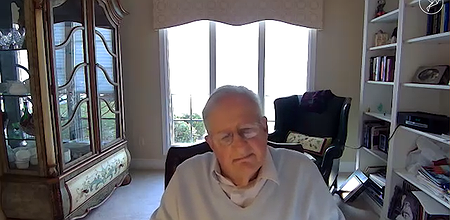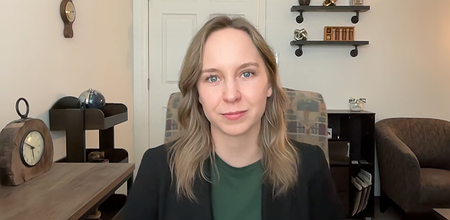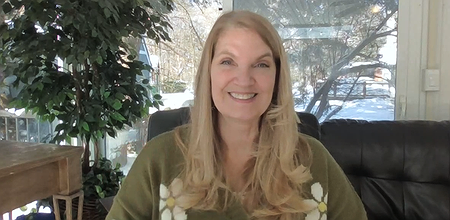- Describe theory and research of self-compassion in psychotherapy
- Improve the therapeutic relationship through compassion and self-compassion practices during the clinical hour
- Define the role of shame in psychotherapy and implement self-compassion to alleviate shame.
- Explain how to cultivate and practice self-compassion at home, between sessions.
Self-Compassion in Clinical Practice: Evidence and Key Strategies
Dr. Chris Germer, Psychologist
Dr. Shari Geller, Psychologist
Strategies to nurture a more balanced way of managing emotions
Excerpt:
- 4h of continuing education
- 31 lessons that last from 5 to 15 minutes each
- 1 certificate of achievement
- 1 PowerPoint
- 1 bibliography
- 1 course evaluation
- 7-day money back guarantee
- Unlimited access
- 92% of participants who completed the satisfaction survey declare they would recommend this course to a colleague
Overview
Avoiding the emotions that naturally arise from life’s many challenges is an instinct that feels natural and is easily succumbed to. However, this avoidance actually increases the distress associated with the situation.
The first step toward a more balanced approach to coping with life’s difficulties is acceptance: recognizing that emotions, even negative ones, are natural mechanisms our brains use to process change. This can be achieved through the practice of mindfulness. The second step is self-compassion: bringing loving awareness to ourselves and nurturing a state of warm, connected presence during difficult moments.
As such, it is an important inner resource that increases resilience, self-esteem and the sense of internal strength. It involves the capacity to comfort and soothe oneself, and to motivate oneself with encouragement when struggling, failing, or feeling inadequate. Thousands of studies show that self-compassion is strongly associated with emotional wellbeing, better coping, healthy habits, more satisfying relationships and lower levels of anxiety and depression.
In a clinical context, self-compassion enables us to maintain emotional balance in the midst of challenging clinical work, to enjoy our clients’ presence and to prevent caregiver fatigue.
In this in-depth training provided by Drs Christopher K. Germer and Shari Geller, you will learn about the theory and research of self-compassion in psychotherapy. You will discover strategies to enhance the therapeutic relationship through compassion.
You will also explore the fascinating role of shame in psychotherapy and learn how to implement self-compassion techniques to alleviate it. Additionally, you will teach clients how to cultivate and practice self-compassion at home, between sessions.
Accreditation
Collège des médecins du Québec
For physicians who practice psychotherapy, training recognized by the Ordre des psychologues du Québec is automatically considered as activities adopted by the Collège des médecins, in accordance with Article 3 of the Regulation.
For physicians who do not practice psychotherapy, the College evaluates each recognition request based on the following criteria:
- the relevance of the activity to the practice of the profession
- the skills and experience of the trainer
- the quality of the content and its adequacy with the physician's practice
- the pedagogical framework of the activity
- the quality of the documentation provided
- compliance with the training objectives set out in the regulation
- the presence of a certificate of participation or an evaluation
About the experts

Dr. Chris Germer, clinical psychologist and lecturer in the Department of Psychiatry at Harvard Medical School.
He co-developed the Mindful Self-Compassion (MSC) program with Dr. Kristin Neff in 2010, with whom he also authored two books, The Mindful Self-Compassion Workbook and Teaching the Mindful Self-Compassion Program. MSC has since been taught to over 150,000 people worldwide.
In addition to having a clinical practice in Massachusetts, USA, Dr. Germer spends most of his time lecturing and leading workshops around the world on mindfulness and self-compassion.
He is also the author of The Mindful Path to Self-Compassion and he co-edited two influential volumes on therapy, Mindfulness and Psychotherapy, and Wisdom and Compassion in Psychotherapy.

Dr. Shari Geller, psychologist, is an author and leader in the field of Therapeutic Presence, clinical psychologist, trained teacher of Mindful Self-Compassion and creator of the Therapeutic Rhythm and Mindfulness Program. With over twenty-five years of experience weaving psychology and mindfulness, Dr. Geller co-authored the book Therapeutic Presence: A Mindful Approach to Effective Therapy with Dr. Leslie S. Greenberg.
She has released a companion CD on cultivating presence, with guided practices using the healing power of music and the health benefits of mindfulness. Her second book, A Practical Guide For Cultivating Therapeutic Presence, offers practical guidance for cultivating and strengthening therapeutic presence as a foundational approach.
Dr. Geller serves on the teaching faculty in Health Psychology at York University and for the Applied Mindfulness Meditation (AMM) program at University of Toronto, and is Adjunct Professor in the Faculty of Music at the University of Toronto, in association with Music and Health Research Collaboratory (MaHRC). She is the co-director of the Centre for MindBody Health in Toronto, where she offers training, supervision and therapy in Emotion-Focused Therapy and mindfulness and self-compassion modalities for individuals and couples.
Learning objectives
Learning material
A theoretical course illustrated with clinical examples. This course is composed of videos of 5 to 15 minutes each. The PowerPoint of the course to download.
Syllabus
- PowerPoint
-
Foundations of Self-Compassion
- 1. Meditation of self-compassion
- 2. Introduction
- 3. Shari's background
- 4. Christopher's background
-
History of Self-Compassion in Psychotherapy
- 5. Brief history of self-compassion in psychotherapy
- 6. CFT, IFS and EFT
-
Neurobiological Mechanisms and Obstacles to Self-Compassion
- 7. The neurobiological mechanisms of action
- 8. The obstacles of self-compassion
- 9. 3 Levels of Integration Into Psychotherapy
- 10. Why presence
- 11. TP Practice- Grounding
- 12. How does presence promote change
- 13. Pre-session Arrival practice
- 14. Strengthening attunement skills
-
Practical Exercises for Clinicians
- 15. Self-Attunement Practice
- 16. Exercise- giving and receiving compassion
- 17. Q&A
- 18. Meditation soft landing on giving and receiving compassion
- 19. Exercise- Silver Lining
- 20. Challenges to listening compassionately
- 21. Listening and speaking from the heart
- 22. Listening and speaking from the heart- reflection
-
Clinical Applications
- 23. Attachment theory
- 24. An antidote to shame
- 25. Self-compassion break for shame
- 26. Working with trauma
- 27. Therapeutic interventions
- 28. Clinical role-play
- 29. Analyze of the clinical role-play
- 30. Final Q&A
- 31. Conclusion
- Bibliography
-
Additional Resources
- Handout - SC in Clinical Practice
- Handout - Cultivating online therapeutic presence
- Handout - Cultivating Self-Compassion in Trauma Survivors
- Handout - Mindfulness and Compassion: Similarities and Differences
- Handout - Self-Compassion in Psychotherapy
- Handout - The Five Myths of Self- Compassion
- Handout - Self-Compassion in Psychotherapy: Clinical Integration, Evidence Base and Mechanisms of Change
- Handout - Therapeutic Presence: Therapists’ experience of presence in the psychotherapy encounter
- Handout - Therapeutic Presence: Neurophysiological Mechanisms Mediating Feeling Safe in Therapeutic Relationships
CE Credits
Download a certificate of successful completion.
Audience
This training is intended for mental health professionals.
Registration
Ask a question
Do you have a question? Then email us at contact@asadis.net
Frequently asked questions
-
Is there an evaluation at the end of the course?
To validate the achievement of the learning objectives, a final evaluation in the form of true/false questions is required. It must be completed in order to obtain the certificate of completion.
In addition, an optional self-assessment is offered at the beginning and end of the course, allowing you to measure your progress on the targeted skills.
These evaluations are not graded and are intended primarily to support your professional reflection.
-
I have a disability. Can I receive specific support?
Yes! This training is offered as a pre-recorded video format, without subtitles. If you have a disability, we can provide an adapted alternative (technical assistance for viewing or individual supervision). For any request, please contact our disability coordinator at the following address: contact@asadis.net
-
How long do I have access to the course?
After your registration, the course is accessible anytime and from anywhere with unlimited access.
-
When does the course start?
That is entirely up to you! When you buy a course, you'll receive an access link that you can activate when you want.
-
Is there a student rate?
Yes there is! To learn more, email us at contact@asadis.net.
You may also be interested in:
Legal notice
The courses offered by ASADIS are accredited by different professional organisations. In addition, ASADIS is approved by the Canadian Psychological Association to offer continuing education for psychologists. ASADIS maintains responsibility for the program.
The CPA’s approval of an individual, group, or organization as a CE Sponsor or Provider is restricted to the activities described in the approved application or annual report form. The CPA’s approval does not extend to any other CE activity the Sponsor or Provider might offer. In granting its approval, the CPA assumes no legal or financial obligations to Sponsors, Providers, or to those individuals who might participate in a Sponsor or Provider’s CE activities or programs. Further, responsibility for the content, provision, and delivery of any CE activity approved by the CPA remains that of the CE Sponsor or Provider. The CPA disclaims all legal liability associated with the content, provision, and delivery of the approved CE activity.






